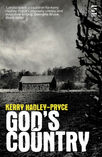The Psychogeography of editing
- Kerry Hadley
- Feb 1, 2019
- 1 min read

'Psychogeography is not unlike reportage; it as an uncovering, a making the invisible visible through connections, patterns and metaphor. But where is the story? This is what makes the mode challenging, for many readers. The story is the journey, of course – whether Sinclair's elliptical pilgrimages or the more deliberate routes charted by Solnit and Carson. What they all have in common is that the story is found when writers step off the intended path, and allow themselves to drift.' Jean McNeil says this in her blog: http://www.jeanmcneil.co.uk/blog/signs-city-psychogeography-literature. I like this quote. I think that I'm finding psychogeography is coming through in this way more as I'm editing. That is to say the novel is getting darker through this 'uncovering'. The female character of Rachael has become the voice of the piece, and the charting of her changing feelings (her changing 'self'?).
The above is a picture of a sunset I took this week, coming back from Uni - on the journey back. I think a lot about what I'm writing on this journey. The picture overlooks Ashwood, not far from Yew Tree Farm, now renamed Holland House, as the place where schoolboy Carl Bridgwater was shot years ago in the 1970s https://www.dailymail.co.uk/news/article-3636902/Who-REALLY-killed-Carl-Bridgewater-Murder-young-paperboy-40-years-ago-remains-one-country-s-terrible-unsolved-murders-mystery-finally-SOLVED.html. Although Yew Tree Farm doesn't specifically feature in my novel, I'm aware of the sense of it lurking somewhere in the background.









Comments